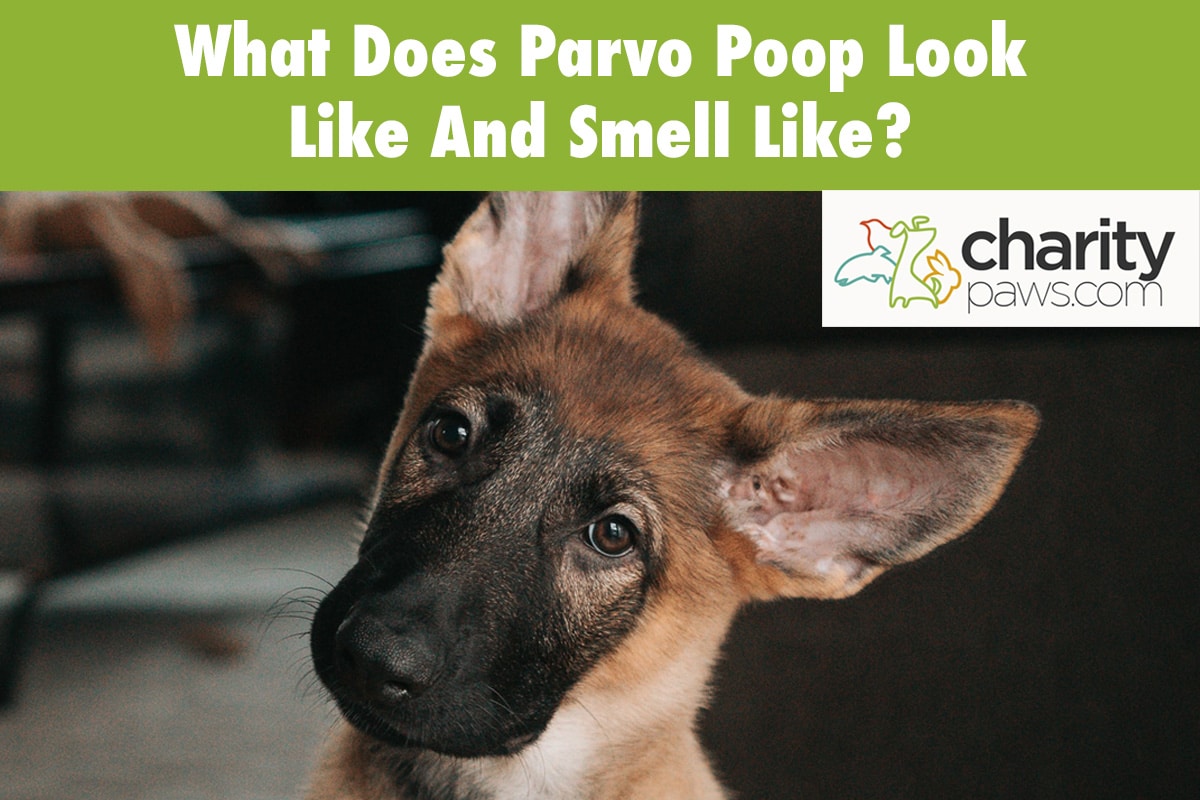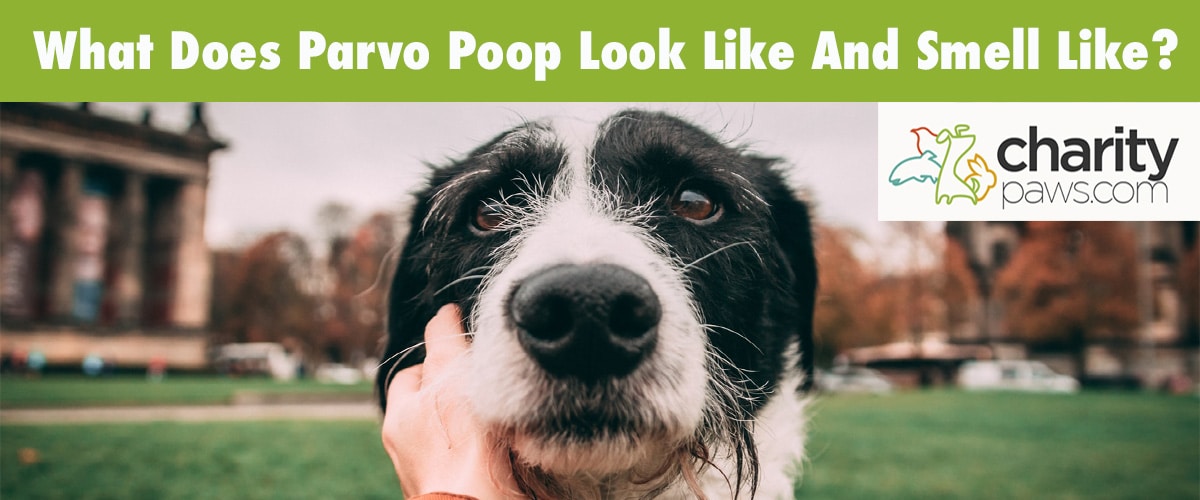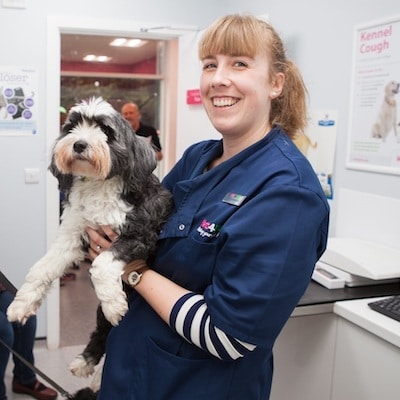If you are the proud parent of a growing puppy, you have likely heard of parvovirus.
Parvo has a reputation of being an aggressive virus that causes severe GI upset, often leading to life-threatening complications for the affected pup.
While you are likely aware of this virus in itself, you may not be aware of the certain characteristics of its poop appearance and smell.
The look and smell of parvo poop cannot offer you a concrete diagnosis, but it can certainly give you a few clues as to what may be affecting your beloved pup.
To help you better understand what parvo poop may look and smell like, let’s go into the details of this condition below.

What Is Parvo In Puppies?
Parvovirus in puppies is a deadly virus that attacks the lining of the gastrointestinal tract (GI tract).
This highly contagious illness makes its way into the body of an unprotected pup, leading to an array of life-threatening symptoms to follow.
By invading the cells of the GI tract and the bone marrow, a combination of severe immune suppression and gastrointestinal symptoms will develop.
Once these symptoms begin, a puppy will require immediate medical intervention to save their lives.
Part of what makes parvo so dangerous is how easily it spreads from dog to dog.
Puppies can catch parvo when they come in contact with infected fecal material, and this can be through direct interaction with another pup or a contaminated surface.
Parvovirus can even live on a surface for up to 3 years if it is not disturbed, which could lead to many pups being infected over time.
Thankfully for our growing canine friends, this virus can be prevented with a series of initial vaccines, followed by regular booster vaccinations.
This vaccine protects against both strains that a puppy can come in contact with, and should offer them a protective barrier as they move forward in life.
Puppies are the most at risk of catching parvo between the ages of 6 weeks to 8 months, so it is essential to get them vaccinated from the moment their age allows.
What Does Parvo Poop Look Like And Smell Like?
Parvo poop is known for having a signature appearance and scent.
While the characteristics of their poop are not a diagnosis in itself, it is something to be aware of if you think your puppy could have parvo.
To help you better understand what parvo poop looks and smells like, let’s discuss the details below.
Keep in mind that this is not the case for every puppy, so you should never rely on these characteristics alone. No matter the smell or appearance of your puppy’s diarrhea, you should still seek veterinary care.
What Does Parvo Poop Look Like?
If your puppy has parvo, they will likely be experiencing severe diarrhea.
Their diarrhea may first be light brown to dark brown in color, and will slowly transition into becoming dark red due to the presence of blood in their stool.
Some puppies will even pass bright red diarrhea, as the irritation in their GI tract is so severe.
In addition to the standard color of their diarrhea is the liquid consistency of the stool they are likely passing.
While their first rounds of diarrhea may simply be soft stool, it will typically progress into a liquid state.
Some puppies will also pass liquid stool with lumps that look like blood clots as a result of their GI tract damage.
What Does Parvo Poop Smell Like?
If you ask any veterinary professional, they will tell you that parvo has a distinct smell that cannot be forgotten.
This smell is a result of the dying cells of their intestinal lining, leading to an overpowering scent.
Parvo poop often has a sweet, yet rotten smell that is pungent enough to knock you off your feet.
The smell of the diarrhea is powerful enough, but it becomes even more pungent as they begin to have blood in their stool.
This almost adds a metallic element to the scent, and even pet owners can realize how different it smells from normal diarrhea.
Can You Know If Your Puppy Has Parvo Based On Their Poop?
Parvo certainly has a distinct appearance and smell, but these characteristics are not enough to diagnose a puppy with the virus.
Other GI illnesses can cause a puppy to have bloody diarrhea, and these illnesses can lead to a similar foul smell as a result.
No matter the smell or appearance of your puppy’s diarrhea, we always suggest having them seen by a veterinarian.
They could be struggling with intestinal parasites, bacterial infections, and even symptoms from dietary indiscretion.
The only way to accurately diagnose your puppy with parvo is with a trip to your vet’s office.
Other Ways To Know If Your Puppy Has Parvo
There are other clues that can point you and your vet to a potential parvo diagnosis.
Some of the most common symptoms of parvo in puppies include:
- Diarrhea
- Vomiting
- Bloody diarrhea
- Abdominal pain
- Anorexia
- Lethargy
- Vomiting even after drinking water
- Gas
- Fever
- Weakness
- Dehydration
- Collapse
- Seizures as a result of low blood sugar
If your puppy has been infected with parvo, most will develop symptoms within 3-10 days of their exposure.
Their symptoms may initially begin with a slight decrease in appetite and some soft stool, but will quickly progress into severe GI upset.
Puppies have the chance at a full recovery when seeking care immediately, so we encourage having your pup assessed as soon as possible if they could have been exposed.
How Is Parvo Diagnosed In Puppies?
We wish it were as simple as looking at your pup’s poop and other symptoms, but the only way to diagnose your puppy with parvo is with a parvo test.
Your vet can perform a fast in-house test that searches for the active virus in their stool, offering either a positive or negative result.
They may also suggest performing blood tests to search for the presence of infection, markers of
dehydration, as well as any changes with your puppy’s red blood cell and platelet count which could
indicate anemia.
Can You Treat Parvo In Puppies?
There is not yet a drug or specific treatment option for parvo, but you can help a puppy recover with aggressive symptomatic and nursing care.
Puppies with parvo will often suffer from severe dehydration as a result of their GI upset, as well as secondary infections due to immune suppression and intestinal damage.
The goal is to:
- Restore their fluid loss
- Control GI symptoms
- Prevent secondary infections
- Provide nutritional support
The standard treatment approach for parvo in puppies includes:
- Hospitalization
- IV fluids
- Nutritional support
- Medication for nausea
- Medication for diarrhea
- Antibiotics to prevent secondary infections and sepsis
Most puppies will need to stay in the hospital for 48-72 hours, but every case will vary.
What To Do If Your Puppy’s Poop Smells Bad
There are many other medical conditions that can make your puppy’s poop smell bad.
Poop doesn’t smell particularly pleasant in the first place, but anything from infectious disease to intestinal parasites can cause their stool to sport a rotten scent.
Due to the varying factors behind their smelly poop, we always suggest having them seen by a vet when you are concerned.
This is especially true if they are experiencing other signs of GI upset, as this can point to an illness that requires immediate treatment.
Final Thoughts On Parvo Poop Look & Smell

Parvo is a dangerous virus that is highly contagious.
You can never diagnose a puppy with parvo by simply looking at their poop or by the smell of their poop, as other conditions can cause similar symptoms.
Since parvovirus is such a deadly virus, it’s important to get professional help as soon as you notice any signs of parvo.
This is why we always suggest getting your pup vaccinated against the GI virus, as well as playing it safe in public settings until they have received all of their puppyhood doses.

